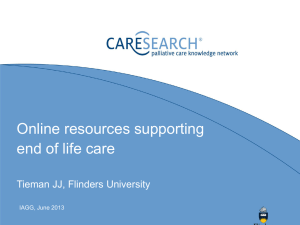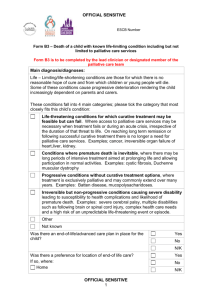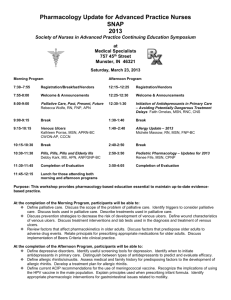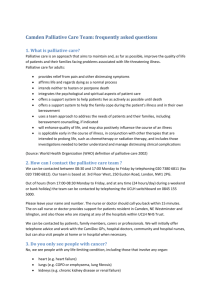Nurses HUB news
advertisement
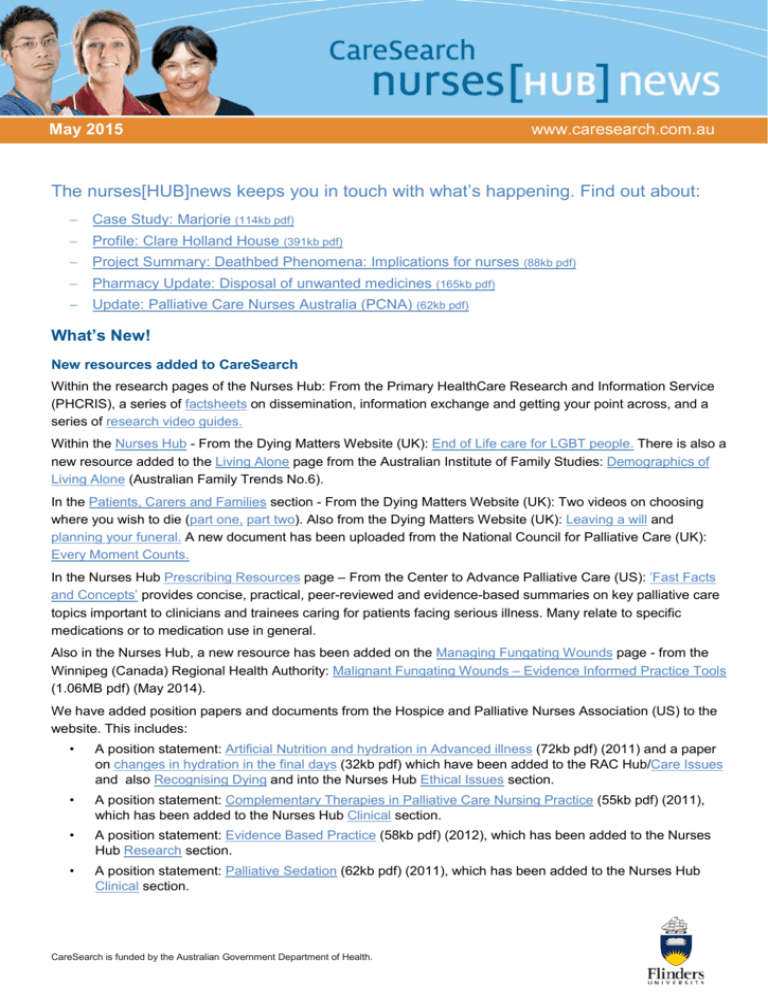
May 2015 www.caresearch.com.au The nurses[HUB]news keeps you in touch with what’s happening. Find out about: − Case Study: Marjorie (114kb pdf) − Profile: Clare Holland House (391kb pdf) − Project Summary: Deathbed Phenomena: Implications for nurses (88kb pdf) − Pharmacy Update: Disposal of unwanted medicines (165kb pdf) − Update: Palliative Care Nurses Australia (PCNA) (62kb pdf) What’s New! New resources added to CareSearch Within the research pages of the Nurses Hub: From the Primary HealthCare Research and Information Service (PHCRIS), a series of factsheets on dissemination, information exchange and getting your point across, and a series of research video guides. Within the Nurses Hub - From the Dying Matters Website (UK): End of Life care for LGBT people. There is also a new resource added to the Living Alone page from the Australian Institute of Family Studies: Demographics of Living Alone (Australian Family Trends No.6). In the Patients, Carers and Families section - From the Dying Matters Website (UK): Two videos on choosing where you wish to die (part one, part two). Also from the Dying Matters Website (UK): Leaving a will and planning your funeral. A new document has been uploaded from the National Council for Palliative Care (UK): Every Moment Counts. In the Nurses Hub Prescribing Resources page – From the Center to Advance Palliative Care (US): ’Fast Facts and Concepts’ provides concise, practical, peer-reviewed and evidence-based summaries on key palliative care topics important to clinicians and trainees caring for patients facing serious illness. Many relate to specific medications or to medication use in general. Also in the Nurses Hub, a new resource has been added on the Managing Fungating Wounds page - from the Winnipeg (Canada) Regional Health Authority: Malignant Fungating Wounds – Evidence Informed Practice Tools (1.06MB pdf) (May 2014). We have added position papers and documents from the Hospice and Palliative Nurses Association (US) to the website. This includes: • A position statement: Artificial Nutrition and hydration in Advanced illness (72kb pdf) (2011) and a paper on changes in hydration in the final days (32kb pdf) which have been added to the RAC Hub/Care Issues and also Recognising Dying and into the Nurses Hub Ethical Issues section. • A position statement: Complementary Therapies in Palliative Care Nursing Practice (55kb pdf) (2011), which has been added to the Nurses Hub Clinical section. • A position statement: Evidence Based Practice (58kb pdf) (2012), which has been added to the Nurses Hub Research section. • A position statement: Palliative Sedation (62kb pdf) (2011), which has been added to the Nurses Hub Clinical section. CareSearch is funded by the Australian Government Department of Health. • A position statement: The role of Hospice and Palliative Nurses in Research (51kb pdf) (2012), which has been added to the Nurses Hub Research section. • A position statement: Spiritual Care (61kb pdf) (2010), which has been added to the Nurses Hub Clinical section. • A patient/family teaching sheet on the final days (67kb pdf) has been added to the RAC Hub Recognising Dying page, and the Patients, Carers and Families section At the End. New paediatric resource Moonshine Movies and Palliative Care Australia (PCA) joined forces to tell Marmaduke’s story as part of the Little Stars series of films about young children facing serious illness. Multicultural aged care funding to continue The Australian Government has committed $3.8 million to extend the Partners in Culturally Appropriate Care (PICAC) Programme for a further two years. The money will be used by aged care providers to deliver staff training and resources to assist staff in delivering culturally appropriate care for older Australians. Dementia resources The Australian Commission on Safety and Quality in HealthCare has developed three resources to guide health service managers, clinicians and consumers in improving care of people with cognitive impairment. The resources follow a pathway, describing strategies that reflect evidence-based practice and existing models of care. They are: actions for health service managers, actions for clinicians, and actions for consumers. Decision Assist palliAGED palliAGED is a new smartphone app that helps GPs who care for older palliative patients at home or in residential care. The app informs key clinical processes such as advance care planning, case conferencing and terminal care management. It also provides prescribing support for common symptoms that patients experience in the terminal phase. palliAGED has been developed as part of the Decision Assist Program. (funded by the Australian Government). The palliAGED app is free. It can be downloaded at the following stores: • Google Play • Windows phone store • Apple iTunes Conferences of Interest Cancer Nurses Society of Australia 18th Winter Congress (‘Cancer Nursing: Expanding the Possibilities’), 14 16 June 2015 at the Perth Convention and Exhibition Centre. Did you know? A report from the Australian Institute of Health and Welfare has looked at the use of aged care services before death. It examines people's use of aged care services in the eight years before death, using the cohort of 116,481 people who died in 2010-11 that were aged at least 65. Overall, 80% of these people had used aged care in the eight years before death, and three-fifths were aged care clients when they died. Just under half of the cohort began using aged care more than four years before their death. CareSearch is funded by the Australian Government Department of Health. Something to read In this edition we are featuring two papers that have recently been published focusing on bereavement: Breen LJ, Aoun SM, O’Connor M. The effect of caregiving on bereavement outcome: study protocol for a longitudinal, prospective study. BMC Palliat Care. 2015 Mar 15;14:6. eCollection 2015. In this study protocol, the authors address three methodological limitations in the current literature by taking a longitudinal, prospective approach with a comparison group, which will be complemented by semistructured interviews. The following research questions are proposed: 1. Does family caregivers’ pre-death (anticipatory) grief and distress predict post-death adjustment? 2. How does the former caregivers’ postbereavement distress compare with that of non-caregivers? 3. What are caregivers’ experiences and understandings of anticipating, expecting, and preparing for the death of the person for whom they are caring? They aim to recruit 82 participants (41 caregivers and 41 matched comparisons) and say that this study will likely make a significant contribution to our understanding of caregiving on bereavement outcome and to bereavement care offered in palliative and hospice settings. Aoun SM, Breen LJ, Howting DA, Rumbold B, McNamara B, Hegney D. Who needs bereavement support? A population based survey of bereavement risk and support need. PLoS One. 2015 Mar 26;10(3):e0121101. eCollection 2015. The survey was constructed to provide information on the population-based experiences of bereavement, including the extent of the alignment of bereavement risk and service need. A postal survey was used to collect information from clients of four funeral providers in Australia, specifically from metropolitan and regional areas of Western Australia and Victoria (May-July 2013), six to 24 months after the death of their family member. A total of 3,190 study packages were delivered to the four funeral providers, and 678 questionnaires were returned completed (21.3 % response rate). The results revealed differential experiences and needs that align with the expectation of low, moderate, and high bereavement risk, as articulated in the public health model. Somewhere to visit The Irish Hospice Foundation highlights the need for palliative care to be extended to people with diseases such as Chronic Obstructive Pulmonary Disorder (COPD), heart failure and dementia. Their Palliative Care for All Programme provides support, direction and guidance to those working with patients to incorporate palliative care principles in care. Are you interested in becoming a member of the Nurses Hub Review group? The nurse’s hub has a fantastic advisory group that help to oversee the progress of the hub and provide advice and support each quarter in relation to the nurses’ hub news. We are calling for expressions of interest from any nurse working in any area (geographic or discipline) where palliative care is a part of their role, to join this group. If you are interested please contact Deb Rawlings at deborah.rawlings@flinders.edu.au Newsletter Basics Follow this link to subscribe to, or email newsletter@caresearch.com.au to unsubscribe from the newsletter. The next edition will be sent on Wednesday 19 August 2015. If there is anything that you would like to contribute, or to suggest as a topic of interest for nurses, please contact Deb Rawlings at deborah.rawlings@flinders.edu.au CareSearch is funded by the Australian Government Department of Health.
